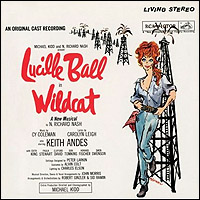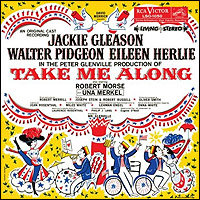
*
TO BROADWAY WITH LOVE [DRG 19122]
DRG's ongoing relationship with the keepers of the old Columbia and RCA Victor catalogues continues to provide treats and curiosities for collectors of original cast albums. Some of these are welcome reissues of out-of-print CDs, while we occasionally get one that has never appeared on CD at all (and in some cases, no wonder). If the newly reissued CDs are somewhat beside the point to readers who already have the prior releases, so be it; they are aimed at the new generations of collectors who are — hopefully — coming along every year. On the other hand, the first-time-on-CD items are most welcome.
In the present trio of releases comes To Broadway with Love, a Bock & Harnick show that few of us have ever heard of. This was a $1,250,000 extravaganza devised for the Texas Pavilion of the 1964 New York World's Fair. Producing a Broadway-style show at a World's Fair was rarely a good idea; people who spent a good deal of time and money to get to the World's Fair were generally more interested in seeing the attractions from around the world rather than ersatz-Broadway entertainment — especially when the Broadway entertainment required a separate admission fee.
To Broadway with Love, as it turned out, wasn't much of a show, nor was it much "of Broadway." If the selections included on the cast album are any indication, there was very little Broadway. The 1940s are represented by six numbers (including "There's No Business Like Show Business," a truncated "Carousel Waltz," and — get this — "I Still Get Jealous" from High Button Shoes); the 1930s are represented by "F.D.R. Jones" from Sing out the News, period. The 1920s, 1950s, and 1960s are represented by nothing at all. They did sing "Dixie" and "Old Folks at Home," though, plus a smattering of George M. Cohan.
The whole shebang in all its "Kraft Music Hall" splendor was devised by Morton Da Costa, whose four consecutive hits in the late 1950s (including The Music Man and Auntie Mame) had already given way to a string of flops. At the podium is Franz Allers, Da Costa's conductor on the 1963 debacle Hot Spot from which they were both hastily fired. Orchestrations are by Phil Lang, who showcases every big Broadway musical cliché and creates some new ones in the process. The show was presented twice a day, with alternating casts, for 97 performances before a cloud of red ink descended. The cast album seems to have selected people from one of the casts, excluding those from the other. The featured soloists on the cast album include Rod Perry (singing the plantation songs and "F.D.R. Jones"); Don Liberto (doing George M. Cohan-type material); and Millie Slavin, whom I remember well from a non-singing featured role in Promises, Promises. Slavin is the most distinctive voice on the album.
What To Broadway with Love does have — and what makes it worth getting hold of — are five songs written-to-order by Jerry Bock and Sheldon Harnick, who at the time were represented on Broadway by She Loves Me. (Fiddler on the Roof was still a few months away from rehearsals.) They consist of a grand title song for the opening and closing; a Ziegfeldian spoof called "Beautiful Lady"; and a tongue-in-cheek sequence peeking ahead at the supposed hits of the next Broadway season. This trio includes a title song for another one of those biographical musicals, along the lines of the shows about Fiorello, Gypsy Rose Lee or Fanny Brice: "Mata Hari Mine" it is called. Who in their right mind would write a musical about Mata Hari? Well, Martin Charnin would — and did — in 1967; Charnin (of Hot Spot) who, as it happened, interpolated a song into To Broadway with Love, the awkward "88 Rag" with music by Colin Romoff. The other two song spoofs are "Remember Radio," forecasting Broadway nostalgia, and something called "Popsicles in Paris." This one, I suppose you could say, takes a breezy look at the rapid spread of regional cuisine around the world; or at least at the dining pavilions at the World's Fair. You never know where you're going to find a delightful song; if "Popsicles in Paris" doesn't sound promising, be prepared for a delightfully swinging waltz from Mr. Bock with a deliciously daffy lyric from Mr. Harnick. Love that song! Popsicles in Paris, shish-ka-bob in Shanghai, bubble gum in Bangkok and Alka-Seltzer back at home; my favorite, here is, "Coconuts in Cambridge, Metracal in Moscow." It's that kind of world, in 1964, from Bock & Harnick to Broadway with Love.
 |
"Hey, Look Me Over!" Lucille Ball chirruped in Wildcat, the 1960 musical which served as a calling card for the new songwriting team of Cy Coleman & Carolyn Leigh. The niftily matched pair proved short-lived, due to that old bugaboo personality problems; Leigh more or less self-destructed during the tryout of the team's sophomore effort, Little Me, and wound up with an unfortunately foreshortened Broadway career. Coleman, of course, went on to a string of other musicals with collaborators. The score to Wildcat is not altogether successful, although parts are extremely enjoyable and highly promising. Wildcat the musical, on the other hand, was an unpleasant affair that closed when the star became too ill to go on; the star being the sole backer, she was thus able to pull the plug when she decided that eight performances a week was eight too many. But that is beside the point. Wildcat the CD gets off to a cannon-burst start; orchestrators Sid Ramin and Red Ginzler, who had burst on the scene six months before with Gypsy, provide an overture with all the sparkle of Gypsy (despite the diminished quality of the music). If the overtures to Gypsy, Tenderloin, and Funny Girl have the most exciting trumpet solos on record, Wildcat seems to have the busiest trumpet section. It is, quite literally, a blast.
Several of Coleman & Leigh's numbers make for infectiously enjoyable listening, such as "Hey, Look Me Over!" (from Ms. Ball and Paula Stewart); "What Takes My Fancy" (from Ms. Ball and Don Tomkins, a character actor who 35 years earlier had helped introduce "The Varsity Drag" in Good News); "Give a Little Whistle" (from Ms. Ball and leading man Keith Andes); and "El Sombero," a mad Mexican hat dance (from star and ensemble). There is also a strong ballad for Mr. Andes, "You've Come Home," and an evocative production number for the male chorus (including Swen Swenson), "Tall Hope." The whole of Wildcat doesn't add up to too much, but show tune fans who haven't been listening to it all these years are likely to be glad to add it to their repertoire.
 |
Take Me Along, which was produced by David Merrick more or less simultaneously with Gypsy, is a far better musical than Wildcat. What it lacks, though, is pizzazz. The working title, and the production company name, was Connecticut Summer, and that just about describes the amounts of charm (lots) and excitement (mild) of the enterprise. Hollywood songwriter Bob Merrill (of "How Much Is That Doggie in the Window?") came to Broadway in 1957 with New Girl in Town, a mediocre musicalization of Eugene O'Neill's Anna Christie which — thanks to the contributions of Gwen Verdon — enjoyed a moderate success. Merrick, who long wanted to musicalize O'Neill's Ah, Wilderness, did not produce New Girl in Town; Hal Prince and his partners did. With Merrill preapproved by the O'Neill estate, Merrick quickly put the composer to work.
Center stage, for better or for worse, was Jackie Gleason. Like Ms. Ball, Gleason was a major TV star; just then, though, he was overexposed. (Hosting that year's Tony Award ceremony, he jested that this was a sneaky way for him to get back on television.) Gleason was worth his weight in entertainment value to Take Me Along, and he did indeed pick up a Best Actor award for his efforts. For what seems to be the only time in history, three people from one show competed in one of the starring role categories, with Gleason besting castmates Walter Pidgeon and Bobby Morse. Also nominated were Andy Griffith for Destry Rides Again, and Anthony Perkins for Greenwillow. The downside to Gleason's presence was that he overpowered the show in what should probably have been written as a secondary lead. (O'Neill's play starred George M. Cohan as the father of the family; Gleason was playing the wayward uncle.) The musical, ultimately, was written with Gleason front and center; Jackie even managed to bring in some of his TV songwriters to beef up the score, although their contributions went unused. Gleason more or less served his purpose, selling enough tickets to allow the show to almost break even. (By the time Merrick's rights expired in the early 1970s, the investors had finally recovered their initial contributions.) It could well be, though, that Take Me Along would have been a stronger and more successful show without Gleason.
If you don't know Take Me Along and if you like '50s-style Broadway musicals, you are bound to quickly find yourself a fan of the score. "Staying Young," "We're Home," and especially "Promise Me a Rose" are my favorites at present, along with the sparkling overture. (The orchestrations are credited to Phil Lang, who did a generally sturdy job. That overture, however, is by Carroll Huxley, whom Lang also called in on Camelot.) Let me add that DRG has seen fit to include the detailed and lengthy liner notes from the CD released by BMG in the early 1990s, which as it happens are the first set of liner notes I ever wrote. And I think they still read pretty well, too. However, be advised that the final page of the booklet — which is newly added — incorrectly states that Take Me Along won the Tony Award for Best Musical. Not so; but then, Gypsy lost that year as well.
(Steven Suskin is author of the forthcoming "The Sound of Broadway Music: A Book of Orchestrators and Orchestrations" (Oxford) as well as "Second Act Trouble," "Show Tunes," and the "Opening Night on Broadway" books. He can be reached at [email protected])










